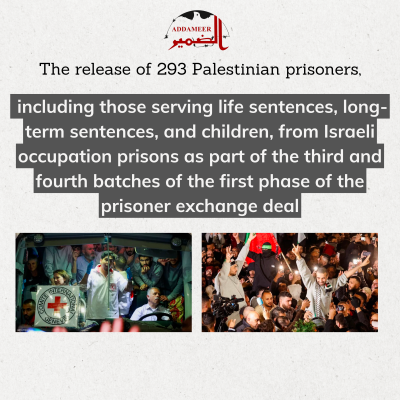
As part of the implementation of the first phase of the prisoner exchange deal, 293 Palestinian prisoners were released in the third and fourth batches. On Thursday, January 30, 2025, the occupation authorities released a total of 110 Palestinian prisoners, including 32 serving life sentences, 48 with long-term sentences, and 30 children. Additionally, 20 prisoners from the West Bank were forcibly deported to the Gaza Strip, including 17 serving life sentences and 3 with long-term sentences.
Yesterday, Saturday, February 1, 2025, the occupation released a total of 183 prisoners. Among them, 111 were arrested from the Gaza Strip after October 7 during the ground invasion, 18 were serving life sentences, and 54 had long-term sentences. Additionally, 7 prisoners sentenced to life imprisonment were deported to Egypt as a first destination.
The released prisoners emerged from the occupation's prisons in critical health conditions due to the harsh circumstances they endured over fifteen months of detention. They suffered from the occupation’s repressive policies, including starvation and dehydration, as well as deliberate medical neglect that persisted throughout their years of imprisonment. Their suffering was not limited to these measures; they also endured physical and psychological torture. Several released prisoners reported being subjected to severe beatings up until the final moments before their release and being deprived of the most basic necessities of human dignity.
This prolonged suffering was starkly reflected in their exhausted faces and frail bodies, becoming evident at the moment of their release. This scene serves as a vivid testament to the ongoing hardship endured by prisoners inside the occupation’s prisons and painfully illustrates the scale of the crimes committed against them during their detention.
Released prisoners in exchange deals continue to face persistent targeting and persecution by occupation forces even after their release, whether through summons for interrogation or re-arrest. Numerous cases of rearrest have been recorded among those freed in the November 2023 exchange deal, including women and children. These policies remain part of the occupation’s ongoing efforts to pressure and retaliate against prisoners by all means.
Most of the recently released prisoners reported receiving threats from occupation intelligence, warning them of possible re-arrest or assassination. Additionally, a significant number of them, including female prisoners, were handed summonses to report to occupation intelligence for interrogation after their release. This highlights the occupation’s systematic attempts to harass and pursue freed prisoners, denying them even the semblance of freedom after their release.
Despite the release of several Palestinian prisoners as part of the exchange deal, the occupation continues to carry out large-scale arrest campaigns across Palestinian territories. Since the announcement of the ceasefire on January 19, 2025, until today, occupation forces have arrested more than 230 Palestinians from the West Bank and occupied Jerusalem.
These raids have targeted cities, villages, and towns across the region, with a particular focus on areas subjected to extensive military operations in the northern West Bank, such as Jenin and Tulkarm. In these areas, occupation forces have detained dozens of civilians as part of their
ongoing military campaigns. Due to the continuous aggression, the full extent of the arrests has yet to be determined.